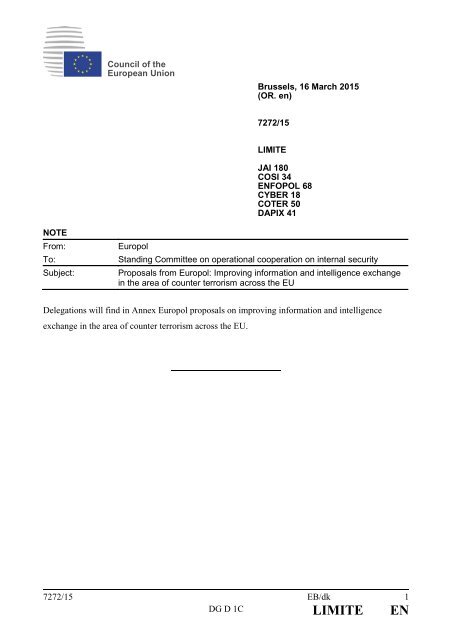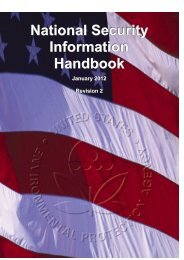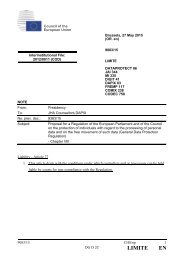eu-council-europol-exchange-of-intelligence-7272-15
eu-council-europol-exchange-of-intelligence-7272-15
eu-council-europol-exchange-of-intelligence-7272-15
You also want an ePaper? Increase the reach of your titles
YUMPU automatically turns print PDFs into web optimized ePapers that Google loves.
Council <strong>of</strong> the<br />
European Union<br />
Brussels, 16 March 20<strong>15</strong><br />
(OR. en)<br />
<strong>7272</strong>/<strong>15</strong><br />
LIMITE<br />
JAI 180<br />
COSI 34<br />
ENFOPOL 68<br />
CYBER 18<br />
COTER 50<br />
DAPIX 41<br />
NOTE<br />
From:<br />
To:<br />
Subject:<br />
Europol<br />
Standing Committee on operational cooperation on internal security<br />
Proposals from Europol: Improving information and <strong>intelligence</strong> <strong>exchange</strong><br />
in the area <strong>of</strong> counter terrorism across the EU<br />
Delegations will find in Annex Europol proposals on improving information and <strong>intelligence</strong><br />
<strong>exchange</strong> in the area <strong>of</strong> counter terrorism across the EU.<br />
<strong>7272</strong>/<strong>15</strong> EB/dk 1<br />
DG D 1C LIMITE EN
ANNEX<br />
The Hague, 16 March 20<strong>15</strong><br />
763944<br />
Proposals from Europol<br />
Improving information and <strong>intelligence</strong> <strong>exchange</strong><br />
in the area <strong>of</strong> counter terrorism across the EU<br />
1 Aim<br />
This document summarises Europol’s proposals regarding the Presidency’s outline on the way<br />
forward, presented to the Justice and Home Affairs (JHA) Council <strong>of</strong> 12 March 20<strong>15</strong>. Section 4 <strong>of</strong><br />
that paper “Step up information sharing and operational cooperation” invites Europol to “submit<br />
proposals on how existing platforms and services can be better used for information <strong>exchange</strong>,<br />
which will be considered by COSI as a matter <strong>of</strong> priority with a view to reporting to the Council in<br />
June.” 1<br />
2 Current situation<br />
The Paris and Riga statements as well as the European Council declaration giving political direction<br />
on enhanced information sharing and operational cooperation are the most recent <strong>of</strong> many such calls<br />
stretching back to 2001 2 .<br />
1<br />
2<br />
doc. 6891/<strong>15</strong> JAI 160 COSI 31 ENFOPOL 57 SIRIS <strong>15</strong> FRONT 51<br />
The European Council Declaration on Combating Terrorism concluded on 25 March 2004,<br />
after the terrorist attacks in Madrid, stated that it is the political objective to “… improve<br />
mechanisms for co–operation and the promotion <strong>of</strong> effective systematic collaboration<br />
between police, security and <strong>intelligence</strong> services. The flow <strong>of</strong> <strong>intelligence</strong> in relation to all<br />
aspects <strong>of</strong> terrorism to Europol should be improved. The further development <strong>of</strong> the<br />
relationship between Europol and <strong>intelligence</strong> services will also be taken forward.…”. Earlier<br />
on, the European Council <strong>of</strong> 21 September 2001 called for “Member States will share with<br />
Europol, systematically and without delay, all useful data regarding terrorism”. The Justice<br />
and Home Affairs (JHA) Council <strong>of</strong> 20 September 2001 concluded “The Council would<br />
reiterate how important it is for the quality <strong>of</strong> Europol analyses that the police authorities and<br />
also the <strong>intelligence</strong> services <strong>of</strong> the Member States should quickly pass on any relevant<br />
information on terrorism …”<br />
<strong>7272</strong>/<strong>15</strong> EB/dk 2<br />
ANNEX DG D 1C LIMITE EN
In 2005, Council Decision 2005/671/JHA on the <strong>exchange</strong> <strong>of</strong> information and cooperation<br />
concerning terrorist <strong>of</strong>fences introduced a legal requirement for Member States to ensure that<br />
information on criminal investigations in respect <strong>of</strong> terrorist <strong>of</strong>fences is sent to Europol.<br />
Europol’s experience, supported by the figures below, is that the expectations generated by these<br />
political decisions have not been generally met, with the potentials for the full and proper use <strong>of</strong><br />
Europol’s information management capabilities not realised in the area <strong>of</strong> counter terrorism.<br />
2.1 Use <strong>of</strong> Europol’s secure information and <strong>intelligence</strong> platform (SIENA)<br />
<br />
<br />
<br />
Only 14 Member States have connected a counter terrorism unit/authority to<br />
SIENA.<br />
In 2014, terrorism crime related information and <strong>intelligence</strong> <strong>exchange</strong> accounted for<br />
4% <strong>of</strong> the overall volume <strong>of</strong> messages <strong>exchange</strong>d (605.000) between EU Member<br />
States, Europol and third parties through SIENA. This ratio has been at comparable<br />
levels since 2010.<br />
This figure showed a significant increase to 8% in January 20<strong>15</strong> but by the end <strong>of</strong><br />
February 20<strong>15</strong> had already returned to the average level <strong>of</strong> 4%.<br />
Resulting from the above SIENA statistics, it emerges that there is still an urgent need to facilitate<br />
awareness and access, as well as engender greater trust in the counter terrorism environment<br />
for sharing information and <strong>intelligence</strong> at EU level.<br />
2.2 Use <strong>of</strong> the Europol Information System (EIS) at Europol<br />
By December 2014, 18 foreign terrorist fighters had been inserted into the EIS by 2<br />
Member States. By the beginning <strong>of</strong> March 20<strong>15</strong> this had increased to 233 submitted<br />
by 8 Member States.<br />
Overall, by the end <strong>of</strong> December 2014, there had been 1125 objects (incl. around 350<br />
person entities) linked to terrorism inserted in the EIS. By the beginning <strong>of</strong> March<br />
20<strong>15</strong> there were 1694 objects (including around 580 person entities) related to<br />
terrorism.<br />
<strong>7272</strong>/<strong>15</strong> EB/dk 3<br />
ANNEX DG D 1C LIMITE EN
2.3 Exploiting Focal Point (FP) Travellers at Europol<br />
<br />
<br />
<br />
<br />
All 28 EU Member States participate in FP Travellers. Australia, Norway,<br />
Switzerland and, since the end <strong>of</strong> February 20<strong>15</strong>, the US Custom and Border Protection<br />
Service (CBP) are associated to FP Travellers. The association <strong>of</strong> Eurojust, the Former<br />
Yugoslav Republic <strong>of</strong> Macedonia (FYROM), Albania and Interpol is currently being<br />
considered by Member States.<br />
Member States have increasingly provided information on foreign terrorist fighters to<br />
Europol since January 2013. The total number <strong>of</strong> contributions was close to 620 by<br />
the end <strong>of</strong> February 20<strong>15</strong>, with over 3.600 person entities stored in FP Traveller.<br />
However, 60% <strong>of</strong> these contributions originate from 5 Member States and one<br />
associated third country.<br />
Recent reporting suggests that Member States believe there are over 10,000 persons <strong>of</strong><br />
interest in the EU with links to foreign terrorist fighters. Despite the positive<br />
developments, there is still a considerable shortfall between the information<br />
available to counter terrorist services and that which is shared with or through<br />
Europol.<br />
2.4 Use <strong>of</strong> Terrorist Finance Tracking Programme (TFTP) through Europol<br />
<br />
<br />
Between the entry into force <strong>of</strong> the TFTP agreement in August 2010 and December<br />
2014, 69 contributions (information provided directly by the US) occurred, resulting<br />
in 1000 <strong>intelligence</strong> leads. 240 requests were sent by Europol and Member States,<br />
leading to 6335 <strong>intelligence</strong> leads. Overall, more than 7300 <strong>intelligence</strong> leads have<br />
been generated by TFTP since it went into force.<br />
In 2014 (from the overall figures), there was also a significantly growing number <strong>of</strong><br />
requests related to the phenomenon <strong>of</strong> travelling fighters (Syria/Iraq/IS). 35 requests<br />
were sent by Europol and Member States, generating 937 <strong>intelligence</strong> leads <strong>of</strong><br />
relevance to 11 Member States.<br />
<strong>7272</strong>/<strong>15</strong> EB/dk 4<br />
ANNEX DG D 1C LIMITE EN
Over January and February 20<strong>15</strong>, 23 contributions were submitted by the US<br />
authorities and 26 requests were sent by EU Member States and Europol, with a total to<br />
date <strong>of</strong> 1983 <strong>intelligence</strong> leads in 20<strong>15</strong> <strong>of</strong> relevance to 17 Member States. This<br />
included 25 <strong>exchange</strong>s within TFTP concerning travelling fighters (Syria/Iraq/IS),<br />
leading to 818 leads specific to this phenomenon.<br />
2.5 Use <strong>of</strong> Check the Web (CtW)<br />
<br />
<br />
<br />
All Member States are part <strong>of</strong> the Check the Web (CtW) portal at Europol which<br />
contains <strong>15</strong>38 entities (statements, publications, videos, audios) that were published in<br />
2014. In addition, Switzerland and Australia are associated third parties.<br />
Europol has observed that terrorist propaganda material now focuses on videos and<br />
audio material, given the expected higher impact on potential supporters and volunteers<br />
through social media.<br />
Since 2007 (when CtW was established at Europol), close to 1<strong>15</strong>00 publication items<br />
have been incorporated onto the portal. The vast majority <strong>of</strong> propaganda items<br />
available on Check the Web were provided by Europol through own monitoring<br />
activities: In 2014, 1 Member State provided 2 contributions while Australia<br />
submitted 8 dedicated analysis reports to CtW.<br />
2.6 Exploiting Focal Point (FP) Firearms<br />
21 Member States are members <strong>of</strong> FP Firearms, which was opened in January 2014.<br />
6 third parties are associated to FP Firearms (Eurojust, Switzerland, Australia, the US<br />
(ATF), Albania and Interpol).<br />
FP Firearms has so far received 1780 contributions, relating to around 300<br />
investigative cases, about 60.000 firearms and close to 1800 suspected companies<br />
involved. Since January 20<strong>15</strong> to today, FP Firearms has received 4<strong>15</strong> contributions.<br />
This shows an increase <strong>of</strong> contributions if compared with the same period last year<br />
(164 contributions received in the same period in 2014).<br />
<br />
The Paris and Copenhagen terror attacks in 20<strong>15</strong> highlight that the terrorists<br />
obtained the firearms from the criminal markets. It is therefore crucial to identify<br />
supply opportunities for terrorist, thus Europol has re-enforced its operational<br />
activities to close this <strong>intelligence</strong> gap.<br />
<strong>7272</strong>/<strong>15</strong> EB/dk 5<br />
ANNEX DG D 1C LIMITE EN
3 Proposals<br />
3.1 Information sharing and operational cooperation<br />
To step-up information sharing and operational cooperation action is required both at Europol and<br />
at the level <strong>of</strong> national authorities. Focusing on existing platforms and services still allows scope for<br />
considering new and innovative approaches without reinventing the wheel. The answer lies more in<br />
exploring how existing platforms and services might be better used rather than identifying whether<br />
new platforms and services are needed.<br />
3.1.1 Actions by Europol<br />
<br />
<br />
<br />
<br />
<br />
<br />
<br />
Building on the Europol experience <strong>of</strong> establishing the European Cybercrime Centre<br />
(EC3) where internal restructuring and reallocation <strong>of</strong> resources and priorities delivered<br />
an effective response Europol intends to follow a similar model in addressing the current<br />
challenge. Establishing an EU Counter Terrorism Centre (ECTC) within the existing<br />
organisational structure <strong>of</strong> Europol ensures the existing platforms and services (listed<br />
in Annex 1) are utilised to maximum effect.<br />
Europol shall provide sealed <strong>of</strong>f, high security <strong>of</strong>fice space (including Faraday<br />
compartments for classified information and <strong>intelligence</strong> handling) to house ECTC.<br />
Europol shall prioritise the work required to facilitate the <strong>exchange</strong> <strong>of</strong> information and<br />
<strong>intelligence</strong> at the level <strong>of</strong> EU CONFIDENTIAL through SIENA (currently EU<br />
RESTRICTED).<br />
Europol shall exploit the opportunities afforded by the cross-matching <strong>of</strong> data between<br />
law enforcement authorities and <strong>intelligence</strong> authorities through the use <strong>of</strong><br />
ps<strong>eu</strong>donymization tools.<br />
Europol shall implement a ”three-tier <strong>intelligence</strong> sharing approach“ ensuring<br />
synergies on data stored on SIS II, EIS and in FP Travellers.<br />
Europol builds an Internet Referral Unit (IRU) as per the guidance <strong>of</strong> the Justice and<br />
Home Affairs Council <strong>of</strong> 12 March 20<strong>15</strong> (see doc. 7266/<strong>15</strong>).<br />
Europol will continue its efforts to engage with counter terrorism units and their<br />
heads in order to step up information and <strong>intelligence</strong> sharing with or through Europol<br />
and by providing a platform at EU level.<br />
<strong>7272</strong>/<strong>15</strong> EB/dk 6<br />
ANNEX DG D 1C LIMITE EN
3.1.2 Actions by Member States<br />
<br />
<br />
<br />
<br />
<br />
Counter terrorism units in all Member States should start using the secure <strong>exchange</strong><br />
system <strong>of</strong> Europol (SIENA) to share information and <strong>intelligence</strong>. This can be<br />
realised by establishing a secure connection through the Europol National Unit (ENU),<br />
or by opting for a direct connection towards Europol (subject to agreement with the<br />
ENU). 3 Counter terrorism units connected to SIENA use a Point-To-Point (P2P)<br />
connection, allowing counter terrorism units to send and receive SIENA messages<br />
directly with other counter terrorism units. While Europol’s FPs can be part <strong>of</strong> the P2P<br />
network they need to be addressed by counter terrorism units directly.<br />
Member States should maximise their use <strong>of</strong> the other Europol platforms and<br />
services (listed in Annex 1).<br />
Member States should improve the mechanism at the national level for sharing<br />
relevant information between the law enforcement including Europol and <strong>intelligence</strong><br />
services.<br />
Member States should improve their information sharing and operational cooperation in<br />
respect <strong>of</strong> the terrorist acquisition and use <strong>of</strong> firearms (see doc. 6739/<strong>15</strong>).<br />
Member States, in particular in the formation <strong>of</strong> COSI, consider promoting Europol as<br />
the channel <strong>of</strong> first choice for information and <strong>intelligence</strong> sharing across EU Member<br />
States.<br />
3.1.3 Actions by Commission<br />
<br />
<br />
The Commission, in the context <strong>of</strong> the development <strong>of</strong> the EU Security Agenda, could<br />
consider promoting Europol as the channel <strong>of</strong> first choice for information and<br />
<strong>intelligence</strong> sharing across EU Member States.<br />
The Commission could promote the use <strong>of</strong> Europol’s key tools and core systems, e.g.<br />
SIENA, EIS and EAS as EU solutions to information sharing requirements.<br />
3<br />
Article 7 (2) <strong>of</strong> the Europol Council Decision (ECD) defines: “The national unit shall be the<br />
only liaison body between Europol and the competent authorities <strong>of</strong> the Member States.<br />
Member States, however, may allow direct contacts between designated competent authorities<br />
and Europol subject to conditions determined by the Member State in question, including<br />
prior involvement <strong>of</strong> the national unit.”<br />
<strong>7272</strong>/<strong>15</strong> EB/dk 7<br />
ANNEX DG D 1C LIMITE EN
3.2 Closing <strong>intelligence</strong> gaps<br />
The absence <strong>of</strong> real time <strong>intelligence</strong> at Europol leads to key <strong>intelligence</strong> gaps which require to be<br />
addressed at the EU level. The following are additional proposals to that end.<br />
<br />
<br />
<br />
<br />
<br />
<br />
Coordination through Europol <strong>of</strong> risk indicators to support targeted checks at the<br />
borders <strong>of</strong> the EU and among EU Member States (travel patterns). On this basis,<br />
relevant follow-on information and <strong>intelligence</strong> being shared with Europol’s key tools<br />
and core systems (e.g. individual pr<strong>of</strong>iling).<br />
Making full use <strong>of</strong> the capabilities <strong>of</strong> EC3, Europol will assess the cyber related<br />
terrorist threat scenarios, focusing on intent and capability.<br />
Close integration <strong>of</strong> the FIU network through Europol (ongoing) to complement the<br />
fight against the financing <strong>of</strong> terrorism beyond TFTP (e.g. payment card fraud,<br />
means and modi operandi <strong>of</strong> terrorists to obtain funds).<br />
Sharing <strong>of</strong> relevant Passenger Name Record (PNR) data with Europol to complement<br />
the analysis <strong>of</strong> travel routes etc. and to enrich counter terrorism FPs. To this end, SIENA<br />
should be adopted as the communication system linking the proposed Passenger<br />
Information Units (PIUs) in Member States.<br />
Ensuring that all possible links between terrorism and organised crime (serious<br />
organised crime related pr<strong>of</strong>ile <strong>of</strong> radicalised individuals posing a terrorist threat;<br />
firearms and explosives supply channels as well as illegal immigration are key areas<br />
linked to terrorism) are identified with a view to initiating relevant operational action<br />
and a consistent and integral response with all relevant authorities.<br />
Information <strong>exchange</strong> between law enforcement and <strong>intelligence</strong> services (within the<br />
given regulatory framework <strong>of</strong> concerned actors – see also Section 3.1.1 above).<br />
<strong>7272</strong>/<strong>15</strong> EB/dk 8<br />
ANNEX DG D 1C LIMITE EN
Existing platforms and services provided by Europol in the area <strong>of</strong> counter-terrorism<br />
ANNEX 1<br />
<br />
Information/<strong>intelligence</strong> capabilities in respect <strong>of</strong> terrorism<br />
<br />
<br />
Secure Information Exchange Network Application (SIENA) – As a central tool to<br />
enable connectivity, SIENA is used to manage the <strong>exchange</strong> <strong>of</strong> operational and strategic<br />
crime-related information amongst Member States, Europol and third party cooperation<br />
partners.<br />
Analysis Work File (AWF) Terrorism is a distinct and self-contained component <strong>of</strong> the<br />
Europol Analysis System (EAS), with individual Focal Points (FPs) to reflect current<br />
priorities in the fight against terrorism 4 thus improving operational analysis, crossmatching,<br />
case and phenomena analysis and coordinated responses incorporating input<br />
from:<br />
<br />
<br />
<br />
<br />
FP Travellers (foreign terrorist fighters travelling to and from conflict zones);<br />
Terrorism Financing Tracking Program – TFTP (targeted searches on data<br />
provided by MS’s);<br />
Check the Web (analysis <strong>of</strong> terrorist propaganda material available on the internet<br />
including threat analysis);<br />
(Planned) Internet Referral Unit (identification and take down <strong>of</strong> extremist internet<br />
material).<br />
4<br />
Europol’s AWF Terrorism also contains the following 3 additional FPs: Hydra (Islamic<br />
terrorism beyond the phenomenon <strong>of</strong> so called travelling foreign fighters), Piracy (East <strong>of</strong><br />
Africa and Gulf <strong>of</strong> Aden maritime piracy), Dolphin (all other terrorist activities, i.e. rightwing<br />
terrorism)<br />
<strong>7272</strong>/<strong>15</strong> EB/dk 9<br />
ANNEX 1 DG D 1C LIMITE EN
The Europol Information System (EIS) is Europol’s central criminal information and<br />
<strong>intelligence</strong> database covering all <strong>of</strong> Europol’s mandated crime areas. It contains serious<br />
international crime-related information on suspects, convicts and ‘potential future<br />
criminals’ 5 , criminal structures, and <strong>of</strong>fences and means used to commit them. It is a<br />
reference system which provides Europol and Member States with a rapid means to<br />
verify whether information on a certain person or another object <strong>of</strong> interest is<br />
available beyond national or organisational jurisdictions.<br />
All new data inserted in the EIS is automatically compared with all information already<br />
stored in the EIS and in the AWFs (e.g. names, telephone numbers, emails, DNA,<br />
firearms, open source <strong>intelligence</strong> etc.) The purpose is to look for matches with a view to<br />
enhancing <strong>intelligence</strong> and providing new leads for further investigations. A distinctive<br />
feature <strong>of</strong> EIS is that it is directly accessible in all Member States on the level <strong>of</strong> the ENU.<br />
This access can be further widened to include national counter terrorism units.<br />
<br />
Provision <strong>of</strong> counter terrorism expertise within a secure environment supported by<br />
strong logistical arrangements<br />
<br />
<br />
<br />
Senior counter terrorism investigators and analytical staff with language expertise<br />
relevant for counter terrorism (security cleared, with background in all relevant competent<br />
authorities across the EU, including the <strong>intelligence</strong> service community)<br />
Utilising established CT networks and services at EU level: Europol National<br />
Contact Points for counter terrorism (informal information <strong>exchange</strong>, meeting facilities<br />
at Europol etc.) and Working Group Dumas: Based on the initiative <strong>of</strong> the former<br />
Presidency in October 2014: EU wide approach to address foreign terrorist fighter<br />
phenomenon<br />
EU Bomb Data System (EBDS): Application for the timely sharing <strong>of</strong> relevant<br />
information and <strong>intelligence</strong> on incidents involving explosives, incendiary and explosive<br />
devices, as well as chemical, biological, radiological and nuclear (CBRN) materials<br />
5<br />
Art. 12 <strong>of</strong> Europol Council Decision (ECD), OJ L 121,<strong>15</strong>.5.2009, p. 37.<br />
<strong>7272</strong>/<strong>15</strong> EB/dk 10<br />
ANNEX 1 DG D 1C LIMITE EN
European Explosive Ordinance Disposal Network (EEODN): Information sharing and<br />
capacity building including training<br />
Option <strong>of</strong> Europol and Member States coordinating high impact operations aimed at<br />
terrorist logistics, e.g. travel or financing.<br />
<br />
Robust security and confidentiality framework<br />
<br />
<br />
Guarantee <strong>of</strong> data ownership for counter terrorism authorities (legal provisions and<br />
operating arrangements, e.g. handling codes)<br />
Information and <strong>intelligence</strong> sharing in a controlled environment, based on the<br />
requirements <strong>of</strong> the data originator.<br />
<br />
Direct and immediate on-the-spot support<br />
<br />
<br />
Mobile <strong>of</strong>fice: Deployment <strong>of</strong> staff with full access to Europol’s databases<br />
First Response Network (FRN) at Europol: In case <strong>of</strong> a major terrorist incident, the FRN<br />
can be established at Europol to provide the best possible support to the competent<br />
authorities in charge <strong>of</strong> the investigation<br />
<br />
<br />
24/7 capabilities to connect terrorism with organised crime activities – Horizontal<br />
information and <strong>intelligence</strong> sharing and data matching<br />
Liaison Bureaux Network at Europol (over <strong>15</strong>0 liaison <strong>of</strong>ficers seconded to Europol by<br />
EU Member States and Europol’s non-EU partners)<br />
<strong>7272</strong>/<strong>15</strong> EB/dk 11<br />
ANNEX 1 DG D 1C LIMITE EN







